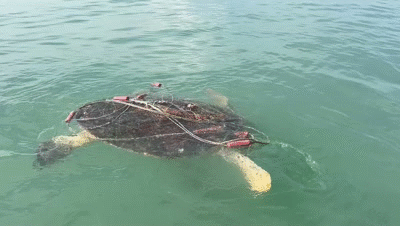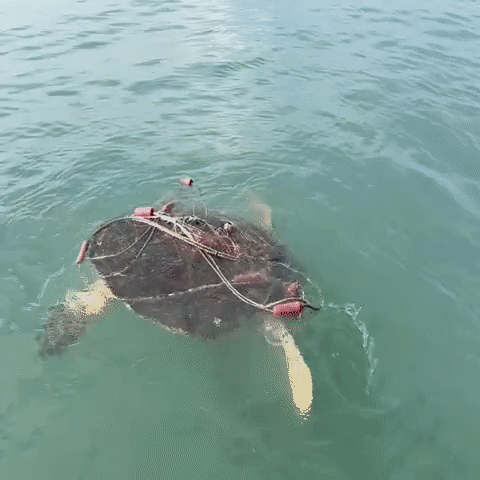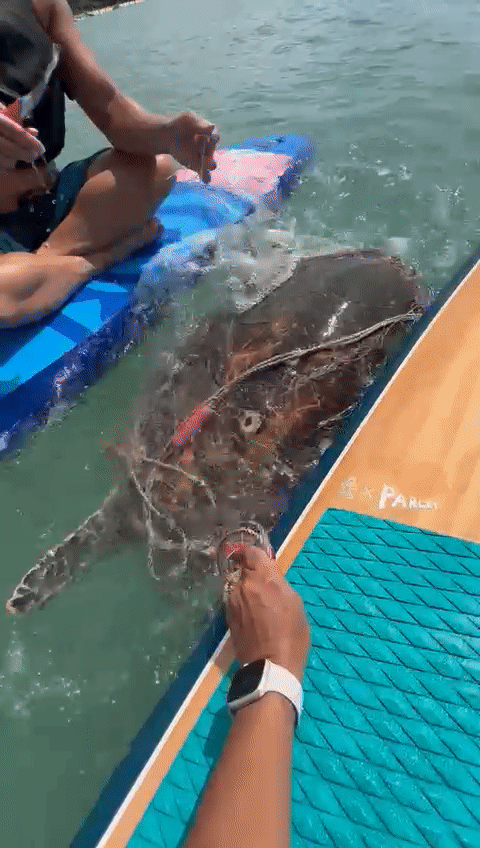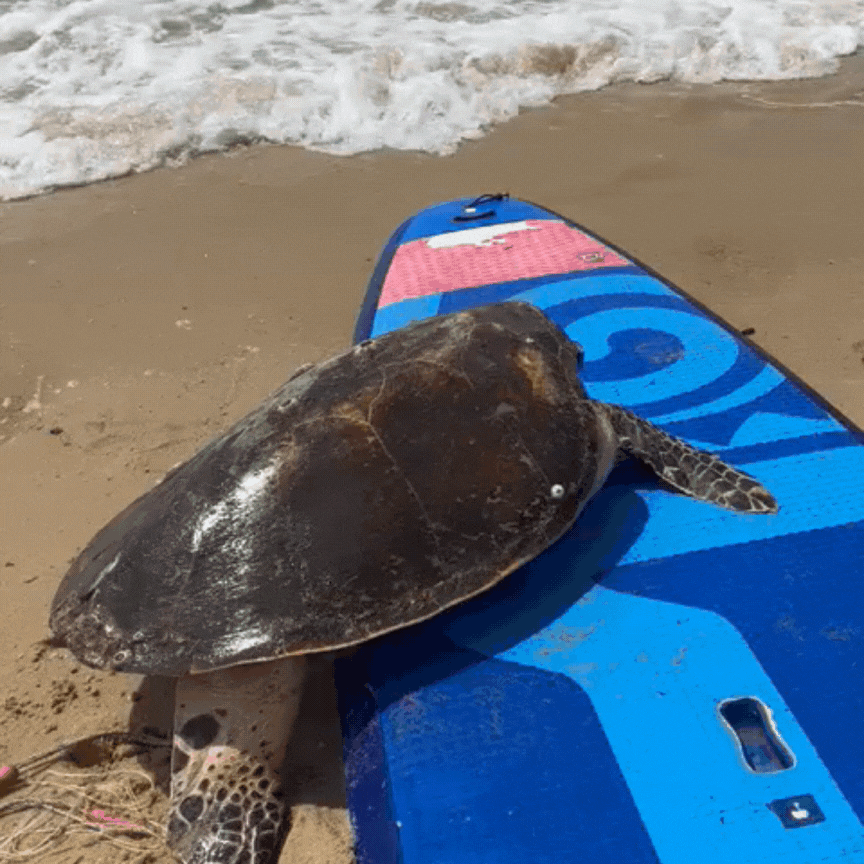Josephine Donaldson was heading back to the beach at East Coast Park on Nov. 7 after a 9am solo stand up paddle boarding session when she noticed a hawksbill turtle entangled in a fishing net.
 Video courtesy of Josephine Donaldson
Video courtesy of Josephine Donaldson
This was the first time Donaldson had encountered this species of turtle in Singapore, especially such a "massive one", she told Mothership.
The turtle was "waddling" and seemed to be struggling, which was when Donaldson noticed something stuck to the back of the turtle.
"When I came closer, I realised it was entangled in fishing nets," she recalled.
 Video courtesy of Josephine Donaldson
Video courtesy of Josephine Donaldson
Attempting to free the turtle
Donaldson first attempted to free the turtle herself, but could not do so as she lacked the necessary tools.
She then contacted the National Parks Board (NParks) for assistance.
However, Donaldson said the staff was "not equipped to enter the water" as they had expected the creature to be on land instead of in the water.
 Video courtesy of Josephine Donaldson
Video courtesy of Josephine Donaldson
Donaldson decided to seek help from the nearby Aloha Sea Sports Centre, where the staff there were able to provide her with tools like a cutter and scissors.
With some of the crew from Aloha, Donaldson started to cut off the nets to free the turtle.
However, the turtle's movements on the ocean waves made it difficult for them to safely cut the ropes.
Successfully freeing the turtle
Collectively, the group managed to carry the turtle onto Donaldson's paddle board and then onto shore, where they were able to cut off the nets surrounding the turtle's neck and body with greater ease.
It took more than two hours and the collective efforts of all involved for the turtle to be freed.
The NParks team assessed the turtle's condition to see if medical assistance was needed, and the turtle, fortunately, was physically unharmed.
 Video courtesy of Josephine Donaldson
Video courtesy of Josephine Donaldson
After the NParks personnel tagged the turtle, it slowly waddled back out to its home in the ocean.
Donaldson said that she had wanted to share this story in order to raise awareness on the the threat marine life can face from discarded fishing nets.
"...And that generally we must all work together to keep our ocean clean," she concluded.
Hawksbill turtle sightings in Singapore
According to the NParks, hawksbill turtles are found in shallow, inshore waters.
In Singapore, they are often sighted in the Singapore Straits around the reefs. Their nests have also been occasionally spotted on the beaches along the southern coastlines.
Every year, a few female Hawksbill turtles return to Singapore shores to lay their eggs, NParks has previously said.
The hawksbill turtle has been marked as 'Critically Endangered' on the International Union for the Conservation of Nature (IUCN) Red list.
Over the years, sea pollution and loss of nesting beaches due to land reclamation has led the hawksbill turtle population to rapidly dwindle over time.
Many also die after being accidentally caught in fishing nets.
NParks has made efforts to protect such species.
In July 2023, under the watchful eyes of the NParks conservation officers, about 120 hawksbill turtle hatchlings hatched and safely made their way to sea.
Leaving with a newfound perspective
Though Donaldson has seen pictures and heard stories of human impact on ocean pollution, this is the first time she has experienced it firsthand.
"Before I was probably just indifferent about it. Not too concerned. But when you see it in person, you feel for...the poor living thing."
She hopes that people will be more aware and mindful of the way they use the ocean, and understand the impact such actions can cause to marine life.
The hawksbill turtle is a protected species under the Wildlife Act.
Members of public are not permitted to collect the hatchlings or eggs, and doing so is an offence under the Wildlife Act.
If you spot hatchlings or a nesting turtle:
- Call the NParks helpline (1800-471-7300).
- Do not touch the hatchlings, turtle or the eggs.
- Keep a safe distance and keep noise levels low by speaking softly.
- Do not shine lights at the turtle or use flash photography as light and noise may scare the turtle and cause it to leave without laying any eggs.
- Keep clear of tracks left by the turtle as researchers may use the tracks to identify the species of the turtle and to locate the nest.
Top photos courtesy of Josephine Donaldson
If you like what you read, follow us on Facebook, Instagram, Twitter and Telegram to get the latest updates.



